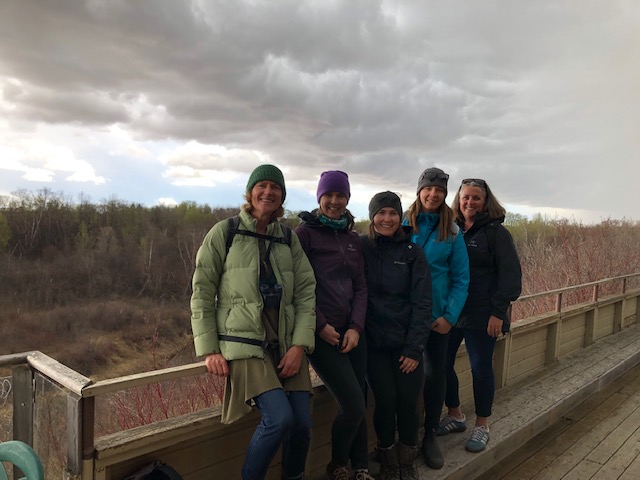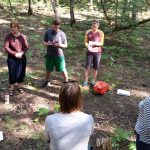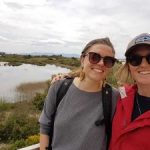Empowering Climate Action through Education
A group of CBEEN members recently attended the #EECOM2019 Canadian Environmental Education Climate Change Conference in Saskatoon with support from our Professional Development Bursary Program which CBEEN offers in partnership with Columbia Basin Trust. They brought home many resources and ideas to share with other educators in the Columbia Basin!
What was most interesting and compelling for me was the idea of activism as education. All the keynote speakers spoke to this idea and how the time is now, especially in the context of climate change. Feelings of despair often overwhelm students when they learn about environmental and social justice issues, especially connected to climate change. Inspiring and supporting students to express themselves and giving them an authentic voice in their communities where they are communicating their opinions and pushing for change, empower them that they are making a difference. The last few years I have been most interested in environmental action-oriented projects in my class. These speakers affirmed that this education is valuable and critical today. I am inspired to push myself to consider social justice issues as well. – Bridget O’Malley, Rossland
At EECOM”s Climate Change Education conference I learned most from three keynote speakers. Tim Swinehart talked about teaching beyond recycling and towards student action. Tim suggests that our students are our best chance to save the planet. The people who will be most affected have done the least to cause climate change. Tim teaches for climate/environmental justice; he considers industrial areas “sacrifice zones” where people and ecology are sacrificed for profit. His book: “A People’s Curriculum for the Earth” includes many stories and lessons to inspire activism. Other Keynote speakers were Sheelah McLean and Sylvia McAdam of the Idle No More movement. Their current focus is “to defend the land we need to defend the people”. First Nation People have the inherent rights to protect the land and will determine the fate of the planet. They shared insights such as the Boreal forest is being logged faster than the Amazon rainforest, the whiteness of “green”, the “Myth of Canadian State Benevolence”, decolonizing the economy, and “Unsettling Canada 150” during our 150 years since 1867. Returning to the values First nations used to conserve our resources will stop climate change. My field trip was to a natural area to see birds with Trevor Herriot. Much of his talk was of the loss of grasslands birds require for migration and nesting. His books also reflect on the need to follow Aborignal land use systems to support natural spaces for birds and other wildlife. – Linda Out, Winlaw
For me, this conference did not so much impart knowledge or skills that could be passed on to environmental educators, as it did challenge participants to reflect on our current practice and re-imagine what we are doing. Probably my biggest takeaway from the conference was Tim Swinehart’s statement that, “We need to move away from learning about environmental issues to supporting students in acting on them.” This can be a controversial idea, but we cannot begin to solve the environmental issues we have created by maintaining the status quo. I was privileged to spend an afternoon with a Grade 8 class attending a year-long “Ecojustice” program offered in Saskatoon. I was so impressed by their commitment to and knowledge of the environment, and the confidence and sense of empowerment they demonstrated. I cannot help but wonder if something similar exists, or could exist, in the Columbia Basin? Another idea that came out of a collaborative roundtable session I attended was that perhaps we need to make it more explicit that Canada’s agreement to the Paris Accord and the UN Framework on Climate Change also involves a commitment to education. As we move forward, especially if our approach involves empowering students to learn about issues and form and express their opinions, we will need to justify and support teachers in their work with students around creating a more sustainable future. – Terri Hayes, Invermere
I had a really amazing and eye opening conference. While most of the time I don’t prefer key notes, I got the most out of them at this EECOM. They were passionate and had incredible presentations. My favourites were Tim Swinehart from Portland Oregon and helped to write the book “A Peoples Curriculum for the Earth”, which is my new favourite resource and coffee table book. Eriel Deranger, who leads indigenous climate action and is an outspoken activist. Finally, Sheelah McClean, an indigenous ally, author or the “The Whiteness of Green” and one of the leaders of the Idle No More Movement. My biggest take away is that here in BC we have an attitude of complacency about our Climate Change Education because we have no big industries we’re up against and the ones that we are, give out so much funding we remain silent when it comes to their contributions to Climate Change. In Alberta and Saskatchewan they have big oil and livestock agriculture that they are up against. They are way more radical and have moved past the idea of focusing on reconciliation from the standpoint of revisiting the history, they are calling all indigenous allies to join the different indigenous groups in a call to action. They have grade 9 students out protesting pipelines and no one is apologizing. I attended a workshop on how to enter into discourse with a climate change denier and change their mind! Mostly, there was a much stronger sense of urgency there. They see and interact with carbon output so much more than we do and they are much more vocal in their opposition. It was refreshing, inspiring and got me interested in protest pedagogy. – Laura Jackman, Rossland
Bridget, Terri, Laura and Linda have recommended the following resources for educators:
- Protest as Pedagogy, Teaching, Learning, and Indigenous Environmental Movements
- Ecoschools.global – this model is coming to BC in the next year!
- Zinnedproject.org – role playing social and eco justice issues
- A People’s Curriculum For the Earth by Bill Bigelow and Tim Swinehart
- Of Land and Living Skies a community journal on place, land and learning
- Project WET
- https://actionchallenge.ca/
- https://albertanarrativesproject.ca/
- https://www.kathyjetnilkijiner.com
- https://www.zinnedproject.org/register
- https://www.rethinkingschools.org/…/a-people-s…
- https://explainingclimatechange.ca/
To find more great climate change education resources, check out CBEEN’s Climate Change Resource Hub!





